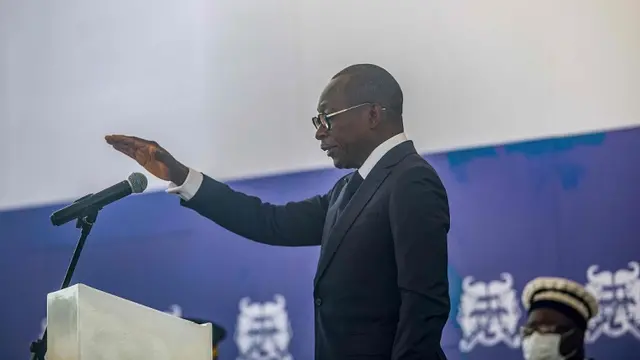At the invitation of Chinese President Xi Jinping, Benin's President Patrice Talon pays China a four-day state visit from August 31 to September 3. The visit injects new impetus into the long-standing diplomatic relations between China and Benin, which have lasted for more than half a century. These ties have been sustained by mutual trust, fruitful cooperation, respect and equality.
While the visit includes a meeting between the two heads of state, President Talon will also meet with Chinese Premier Li Qiang, and attend the Global Trade in Services Summit.
With trade being an indispensable component of the talks between both parties, the presence of President Patrice Talon at the Global Trade in Services Summit in Beijing presents an opportunity to further enhance trade cooperation between the two countries. Indeed Talon's visit follows the recently concluded 13th edition of the Chinese Products Fair on August 21 to 24 in Cotonou, Benin's economic capital.
For Benin, leveraging this opportunity to enhance access to the colossal Chinese market means the West African country can gain additional economic value for its various commodities and exports including gold, refined petroleum, coconut, oil seeds and raw cotton.
China-Benin trade cooperation has a long precedent. For example, since 2013 China has delivered a cotton technical assistance project to Benin, which includes training in the selection and breeding of cotton seeds, agricultural machinery and planting technology demonstrations. The project has improved the quality of Benin's cotton production, the country's major agricultural export and supplemented farmer's income. With the support of this project, Benin is now ranked among the highest cotton producers in Africa for three consecutive years and expects to produce 1 million tons of cotton in 2023.
China's support has also significantly boosted growth in Benin's cotton value chain in recent years, an effort that has protected livelihoods – against the backdrop of the global economic downturn. The global economic struggles have had a particularly detrimental impact on African countries, including Benin. In 2022, the country's agriculture sector, particularly cotton and the services sector were the only two that recorded growth.
To further accelerate Benin's economic growth, during his state visit, Talon expects elevated cooperation with China in agribusiness. Benin faces formidable challenges as it seeks to develop its agriculture sector, which employs almost half of its labor force. While the country's agriculture has the potential to drive sustainable growth and employment, low-farm productivity has led to modest agriculture growth in Benin. Benin's low farm productivity has been largely attributed to prevalent rain-fed and subsistence agriculture, accompanied by a deforestation rate of more than twice that of sub-Saharan Africa at large over the years.
As both countries seek new heights in cooperation, characterized by mutual benefit, Benin expects to tap into China's vast experience and outstanding achievements in agriculture modernization and reforestation to address daunting challenges threatening its economic output.
Meanwhile, China, which has replanted 3.83 million hectares of trees and planted 3.21 million hectares of grassland in 2022, will share vital lessons to Benin, through the Asian giant's key initiatives, including the Global Development Initiatives (GDI), designed to support the timely achievement of the 17 UN Sustainable Development Goals.
In a similar fashion, through increased cooperation with China, particularly via the Belt and Road Initiative (BRI), Benin can modernize its transport infrastructure, which could bring enormous social and economic gains.
According to the World Bank's first-ever (2023) economic update for Benin, renewed effort and increased investment in developing and modernizing the ports and roads in the country could improve livelihoods and help transform the country's economy.
The report noted that Benin, strategically located in West Africa, serving as a gateway to landlocked countries including Burkina Faso and Niger – together with the country's port of Cotonou, the closest and fastest transshipment point to the port of Lagos, a major financial center in Africa, can benefit enormously from modernized road networks.
Through increased cooperation with China, particularly via the BRI, Benin can modernize both national and regional transport infrastructure – facilitate the movement of goods and services, reduce travel time, lower transportation costs for businesses, and enhance access to markets in other countries. This will serve as an example of win-win cooperation between China and Benin, as both countries pursue a common goal.
(CGTN)
 简体中文
简体中文

